Free Vermont Last Will and Testament Form
A Vermont last will and testament is a document that contains the final will of its maker (testator) and outlines how and by whom his or her property will be used in case of the testator’s death. Generally, most of us will only benefit from having a last will in place.
On this page, you can download a free will form that you can fill out online. In addition to that, there are a lot of details in relation to the last will drafting process and relevant laws.
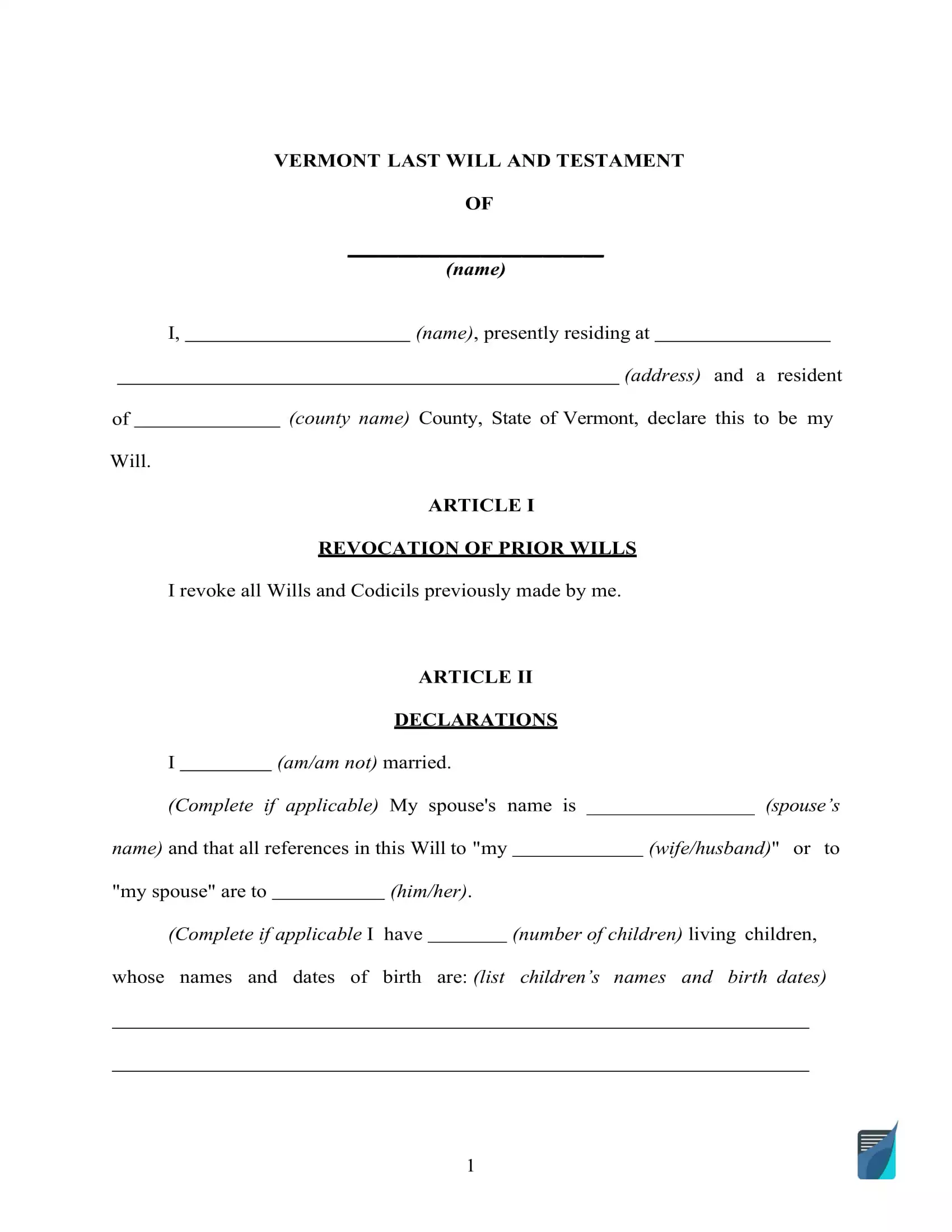
Build Your Document
Answer a few simple questions to make your document in minutes
Save and Print
Save progress and finish on any device, download and print anytime
Sign and Use
Your valid, lawyer-approved document is ready
Vermont Last Will Laws and Requirements
| Requirements | State laws | |
| Statutes | Title 14 – Decedents Estates and Fiduciary Relations; Chapter 1 – Wills | |
| Signing requirement | Two witnesses | § 5. Execution of will; requisites |
| Age of testator | 18 or older or an emancipated minor | § 1. Who may make |
| Age of witnesses | 18 or older | § 5. Execution of will; requisites |
| Self-proving wills | Allowed | § 108. Self-proved wills |
| Handwritten wills | Might be recognized if witnessed according to the state law | § 5. Execution of will; requisites |
| Oral wills | Might be recognized in specific cases | § 7. How made by soldier or sailor; military will |
| Holographic wills | Might be recognized in specific cases | |
| Depositing a will | Possible with the Probate Division of the Vermont Superior Court. The fee is $30 | § 2. Deposit of will for safekeeping; delivery; final disposition § 1434. Probate cases |
How to Make a Vermont Last Will and Testament
1. Consider your options. Prior to getting started, you may want to decide if you’d like to use the expertise of a legal professional or create the whole thing on your own. In the event that you wish to create the last will and testament by yourself, pick the type you will use: a handwritten will or maybe a will template.
2. Indicate your information. Fill in your full name and address (the city, county, and state of residence) to determine the testator of the last will. Go through the information you wrote along with the rest of the section, including “Expenses and Taxes”.
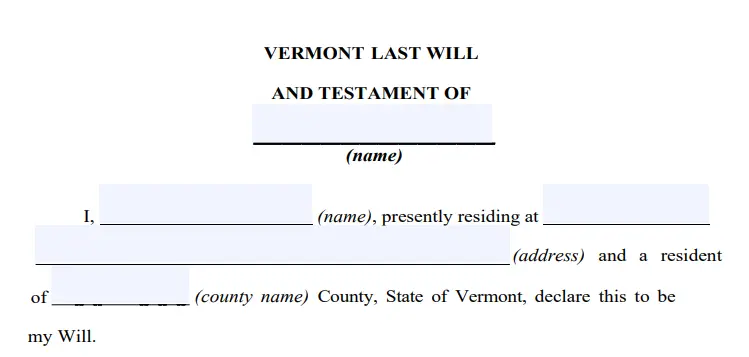
3. Appoint the executor (or executrix). Appoint the executor of your estate and enter their details: full legal name and place of residence, which will typically be in the same state the testator lives in since most states enforce special policies on out-of-state executors. As a safeguard, it’s possible to designate an alternate executor of the last will and testament. This way, you will be able to make sure that even if the originally appointed executor can’t perform their obligations, there is a second dependable person you can count on.
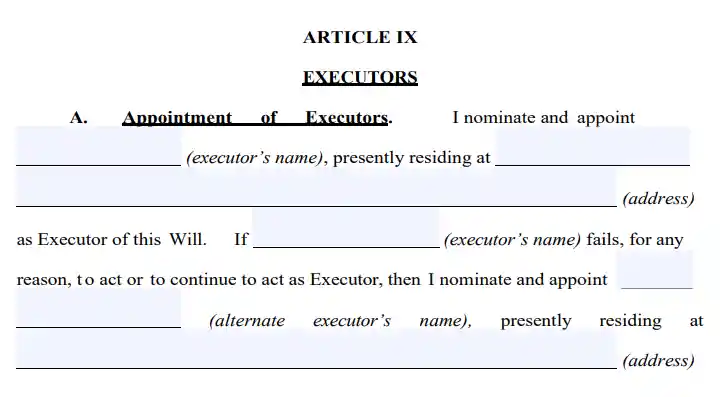
4. Choose the guardian (optional). You are able to specify a trusted person as a guardian if you have underage or dependent children that must be taken care of. If there are no directions concerning who exactly should look after your kids, the guardian will be appointed by the court.
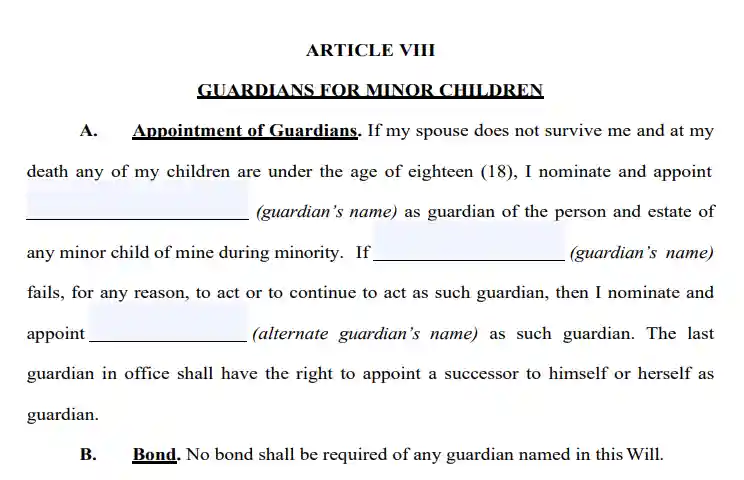
5. Specify your beneficiaries. Now specify all those to whom you’d like to hand your assets on, that is, your beneficiaries. For each beneficiary, enter the next particulars: full name, address, and the way they are related to you.
6. Assign possessions. When you have an asset allocation in mind that’s different from equal, you can describe it in this part. Money for unpaid arrears, real estate, stocks, company ownership, cash, as well as any material things of financial worth that count among your possessions can be brought up in your will. Please notice that there are things that can’t be distributed in your last will and testament, such as life insurance and shared and living will assets.
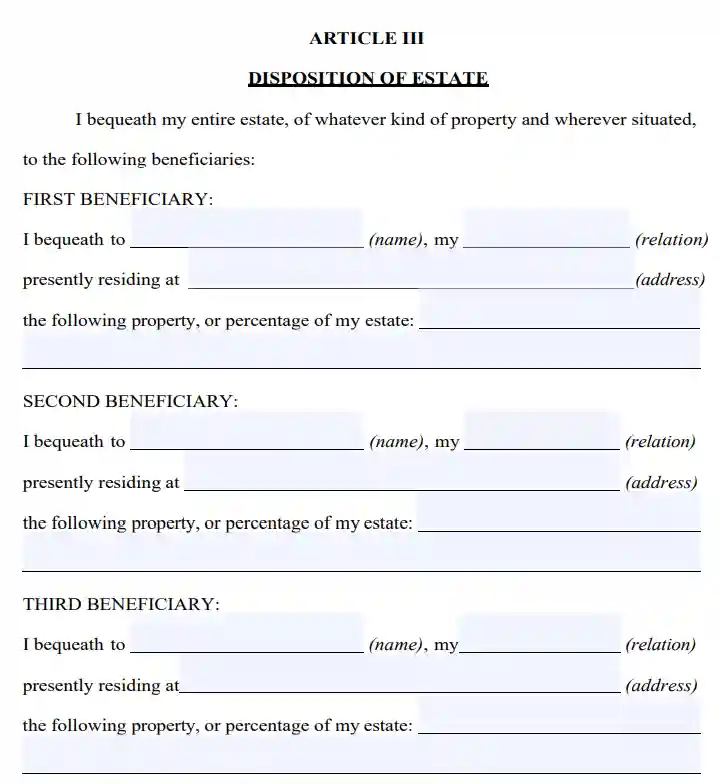
7. Ask witnesses to finalize the document. As per Vermont Statutes, for a last will to be considered legitimate, it has to be signed by two witnesses. You may appoint someone as a witness provided that they are over the age of 18 years and are disinterested in the heritage. As a possible added precaution against cases when the will is contested or any other problems, it’s a wise decision to assign a witness who’s younger than you to make sure they will still be there after you depart this world. Now, you (as well as your two witnesses) must sign the paper after filling out your full legal addresses and names. Do not forget to examine each section thoroughly before concluding the matter.
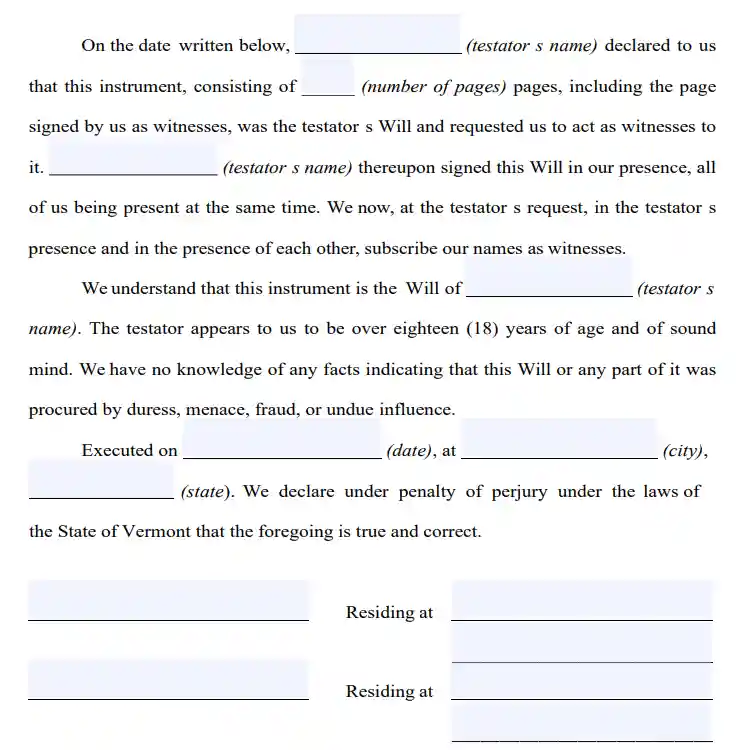
Create a Free Vermont Last Will Template
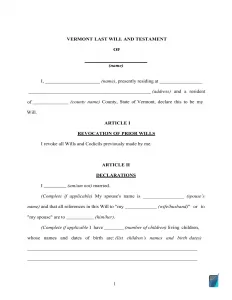
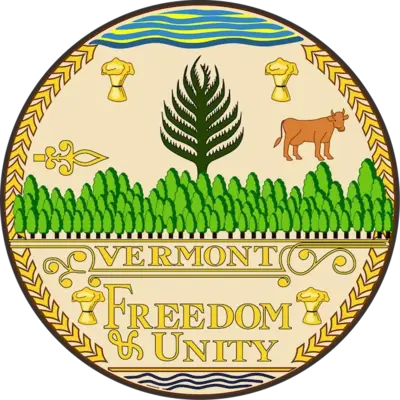
Frequently Asked Questions
Should I notarize my last will in Vermont for it to be effective?
Vermont statute says that a last will is valid without having a notary public certify it. Having said that, you’ll need a notary public if you wish to make your will self-proving by attaching an affidavit to the document. A self-proving will makes the validation process faster since the court can accept it without speaking to the witnesses who are involved.
Does a last will require a self-proving affidavit in Vermont?
No, in Vermont, there is no such requirement. However, including one may be quite useful given that it removes the demand for witnesses’ testimony in the course of probate, which facilitates the procedure considerably.
Is a child or spouse disinheritance allowed?
Vermont is not a community property state. Often called marital property, it is a form of asset ownership provided by the law that says that 50 % of all assets (including arrears) of one spouse belongs to another and stays such upon divorce. Vermont law determines that you can cut your spouse out of your last will entirely, but some minimum amount of your estate can still be owned by them.
For other members of your family, it’s possible to legally disinherit anybody else. It refers to your adult children and other relatives; simply include disinheritance paragraphs to your last will.
Can I modify a typewritten last will and testament after signing it (in Vermont)?
Yes, it is possible.
In Vermont, if you have not engaged in an agreement stating the opposite, it is possible to revoke or alter your last will at any time.
It can be a good idea to modify your will when an important event comes about in your life. These include but are not limited to:
- Birth or adoption of a child
- You got divorced or married
- You purchased or sold real estate or a major piece of property
- Considerable changes in your finances
What are the consequences of losing a last will?
In Vermont, the law implies that the court will recognize a last will and testament in case it’s damaged or lost. However, the probate court is not likely to accept anything except for the initial version of the last will to probate.
In line with Vermont law, the will’s absence can be regarded as its revocation. That implies that the trustee should prove the last will’s credibility, which in turn might prove to be rather difficult.
For holographic last wills, the process may be much more problematic because sworn witnesses and testimony are demanded. The reason behind not providing the last will and testament and its elements must be demonstrated too.
In case I'm physically incapable of signing my last will, what do I have to do?
Only per your directive and with you present can someone sign your will (See Vermont Estate Code). The testator can express their wishes in words, by way of giving a positive answer to an inquiry or using body language.
A notary is allowed to sign the testator’s name if the testator isn’t able to do it due to a physical impairment. The notary has to be directed to perform so with a witness present. This witness is chosen the same way someone could choose an executor – they must not have any legal or equitable interest in any property and assets that are the issue matter of or influenced by the will.
Other Documents Related to Wills in Vermont
| Related documents | Times when you might want to create one |
| Codicil | There are some small adjustments you wish to make to your last will. |
| Self-proving affidavit | You wish to facilitate the probate in the future. |
| Living will | You want to state your wishes concerning the end-of-life health care and life-prolonging procedures. |
| Living trust | You want to look at an alternative to a last will. |
Last Will and Testament Forms for Other States
